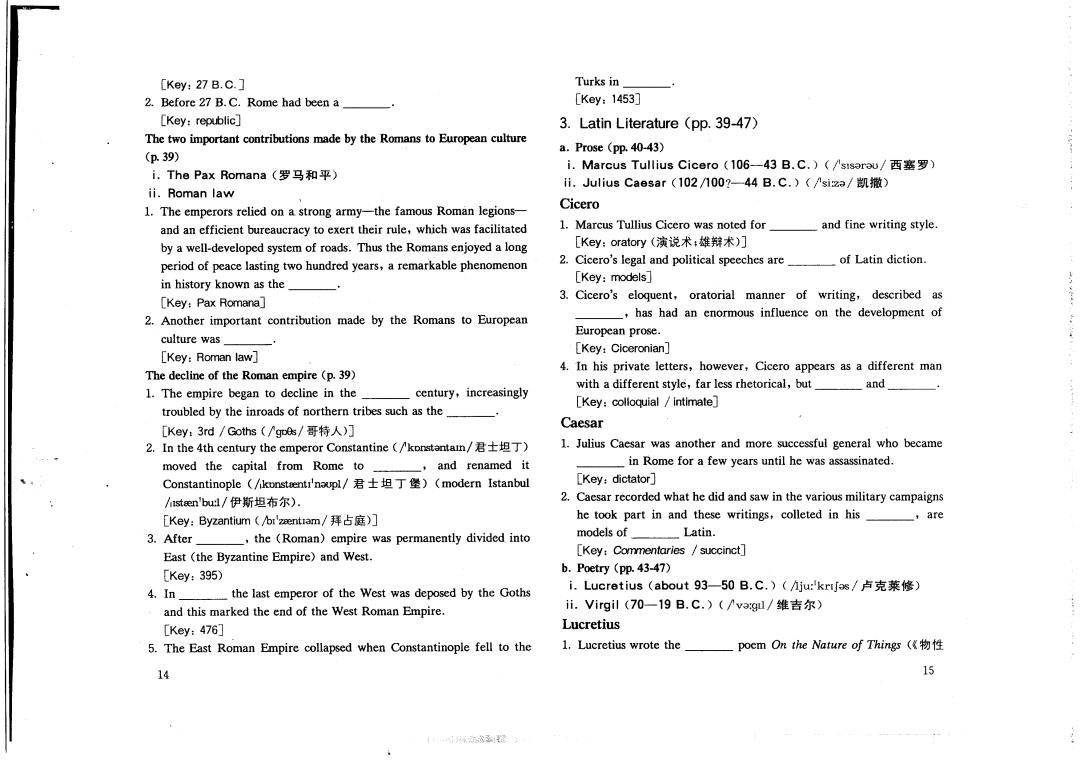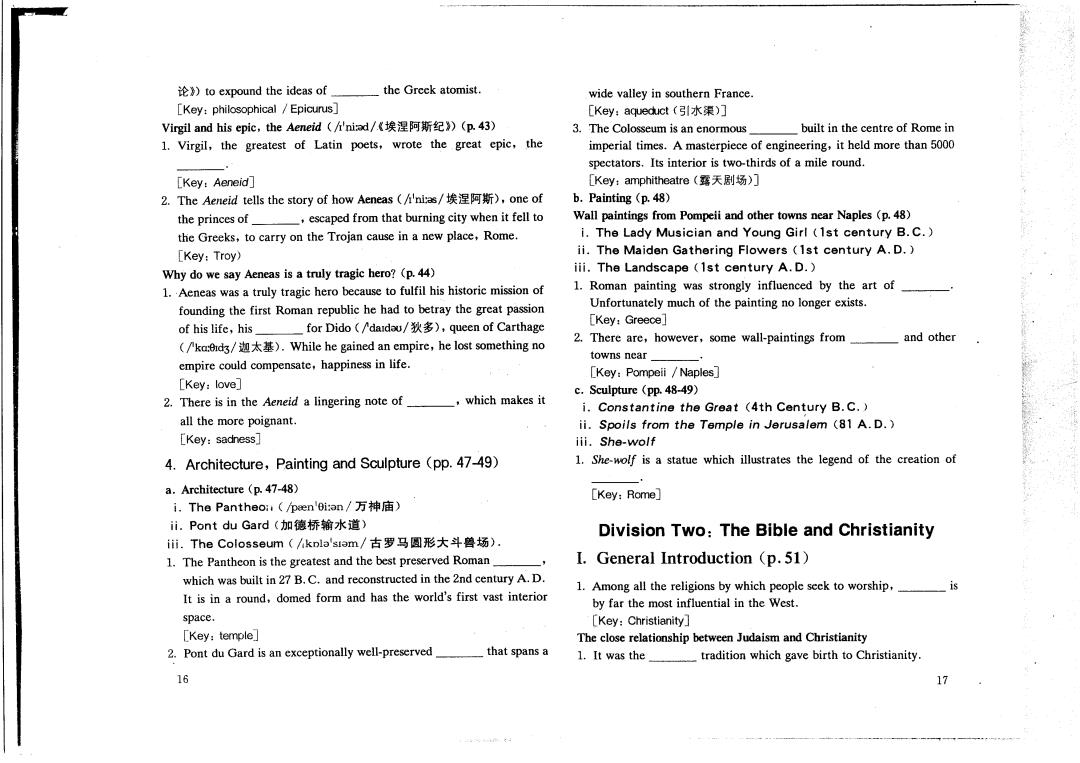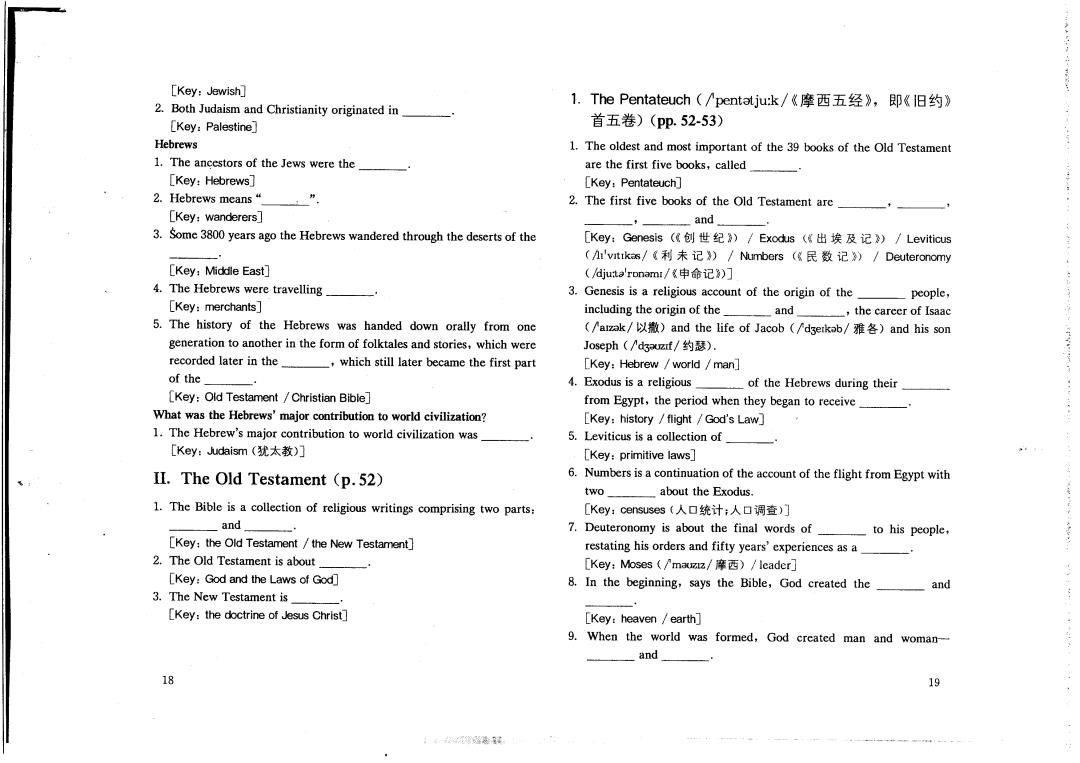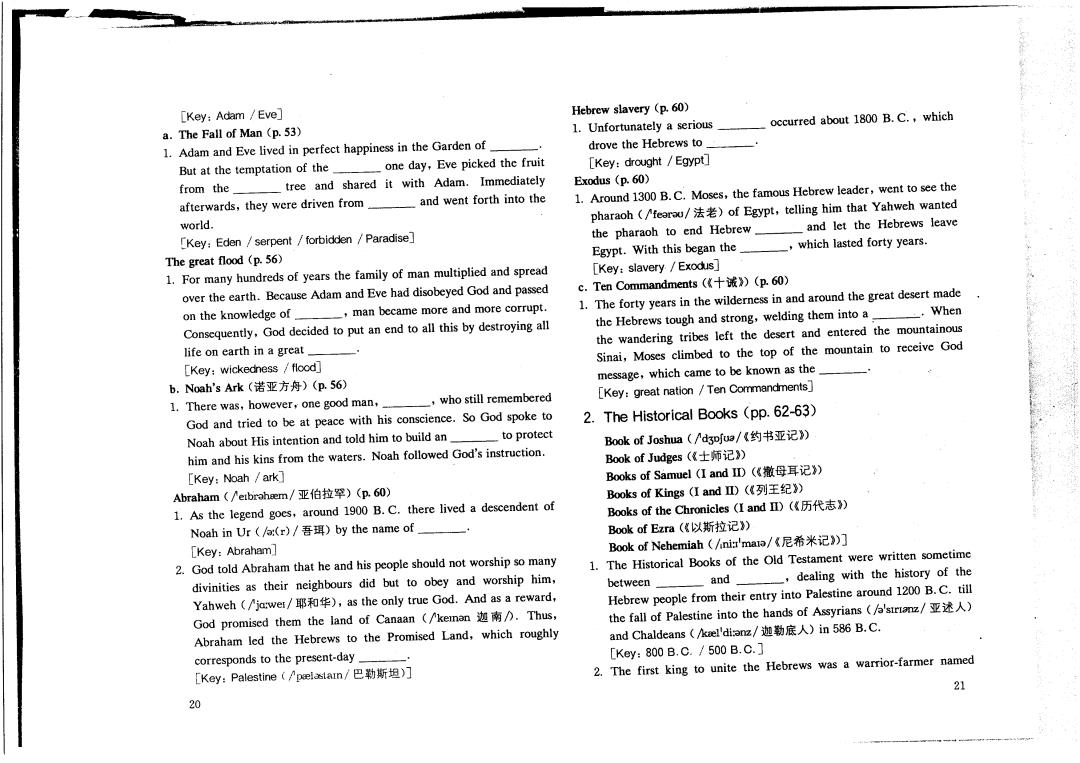
[Key:27 B.C.] Turks in 2.Before 27 B.C.Rome had been a [Kay:1453] [Key:republic] 3.Latin Literature (pp.39-47) The two important contributions made by the Romans to European culture (p.39) a.Prose (pp.40-43) i.Marcus Tullius Cicero(106-43B.C.)(/'sis3rau/西睾罗) i.The Pax Romana(罗马和平) i.Julius Caesar(102/100?44B.C.)(siza/凯撒) ii.Roman law 1.The emperors relied on a strong army-the famous Roman legions- Cicero and an efficient bureaucracy to exert their rule,which was facilitated 1.Marcus Tullius Cicero was noted for and fine writing style. by a well-developed system of roads.Thus the Romans enjoyed a long [Key:oratory(演说术:雄辩术)] period of peace lasting two hundred years,a remarkable phenomenon 2.Cicero's legal and political speeches are of Latin diction. in history known as the [Key:models] [Key:Pax Romana] 3.Cicero's eloquent,oratorial manner of writing,described as 2.Another important contribution made by the Romans to European _has had an enormous influence on the development of culture was European prose. [Key:Roman law] [Key:Ciceronian] The decline of the Roman empire (p.39) 4.In his private letters,however,Cicero appears as a different man 1.The empire began to decline in the century,increasingly with a different style,far less rhetorical,but and [Key:colloquial intimate] troubled by the inroads of northern tribes such as the [Key:3rd/Goths(go/哥特人)] Caesar 2.In the4 th century the emperor Constantine(konstantain/君士坦丁) 1.Julius Caesar was another and more successful general who became moved the capital from Rome to ,and renamed it in Rome for a few years until he was assassinated. Constantinople(/konsteent'naupl/君士坦丁堡)(modern Istanbul [Key:dictator] /1stn'bu:l/伊斯坦布尔). 2.Caesar recorded what he did and saw in the various military campaigns [Key:Byzantium(br'zentram/拜占庭)] he took part in and these writings,colleted in his,are 3.After the (Roman)empire was permanently divided into models ofLatin. East (the Byzantine Empire)and West. [Key:Commentaries succinct] [Key:395) b.Poetry (pp.43-47) 4.In the last emperor of the West was deposed by the Goths i.Lucretiu5(about93一50B.C.)(ju:'krjs/卢克莱修) and this marked the end of the West Roman Empire. ii.Virgil(70-19B.C.)(v3gl/维吉尔) [Key:476] Lucretius 5.The East Roman Empire collapsed when Constantinople fell to the 1.Lucretius wrote the _pocm On the Nature o时Things(《物性 14 15 1馆就经

to expound the ideas of the Greck atomist. wide valley in southern France. [Key:philosophical /Epicurus] [Key:aqueduct(引水巢)] Virgil and his epic,the Aeneid(niad/《埃涅阿斯纪)(p.43) 3.The Colosseum is an enormous built in the centre of Rome in 1.Virgil,the greatest of Latin poets,wrote the great epic,the imperial times.A masterpiece of engineering,it held more than 5000 spectators.Its interior is two-thirds of a mile round. [Key:Aeneid] [Key:amphitheatre(露天剧场)] 2.The Aeneid tells the story of how Aeneas('nias/埃涅阿斯),one of b.Painting (p.48) the princes of,escaped from that burning city when it fell to Wall paintings from Pompeii and other towns near Naples (p.48) the Greeks,to carry on the Trojan cause in a new place,Rome. i.The Lady Musician and Young Girl (1st century B.C. [Key:Troy) ii.The Maiden Gathering Flowers (1st century A.D. Why do we say Aeneas is a truly tragic hero?(p.44) iii.The Landscape (1st century A.D. 1.Aeneas was a truly tragic hero because to fulfil his historic mission of 1.Roman painting was strongly influenced by the art of founding the first Roman republic he had to betray the great passion Unfortunately much of the painting no longer exists. of his life,his for Dido (/daidou/),queen of Carthage [Key:Greece] (ka:0id3/迦太基).While he gained an empire,he lost something no 2.There are,however,some wall-paintings from and other towns near empire could compensate,happiness in life. [Key:Pompeii /Naples] [Key:love] c.Sculpture (pp.48-49) 2.There is in the Aeneid a lingering note of which makes it i.Constantine the Great (4th Century B.C.) all the more poignant. ii.Spoils from the Temple in Jerusalem (81 A.D.) [Key:sadness] iii.She-wolf 4.Architecture,Painting and Sculpture (pp.47-49) 1.She-wolf is a statue which illustrates the legend of the creation of a.Architecture (p.47-48) Key:Rome] i.The Pantheo:(pen'ian/万神庙) ii.Pont du Gard(加德桥输水道) Division Two:The Bible and Christianity ii.The Colosseum(/kpla's1am/古罗马圆形大斗兽场). 1.The Pantheon is the greatest and the best preserved Roman I.General Introduction (p.51) which was built in 27 B.C.and reconstructed in the 2nd century A.D. 1.Among all the religions by which people seek to worship, It is in a round,domed form and has the world's first vast interior by far the most influential in the West. space. [Key:Christianity] [Key:temple] The close relationship between Judaism and Christianity 2.Pont du Gard is an exceptionally well-preserved that spans a 1.It was the tradition which gave birth to Christianity. 16 17

[Key:Jewish] 2.Both Judaism and Christianity originated in 1.The Pentateuch(pentalju:k/《摩西五经》,即《I旧约》 [Key:Palestine] 首五卷)(Pp.52-53) Hebrews 1.The oldest and most important of the 39 books of the Old Testament 1.The ancestors of the Jews were the are the first five books,called [Key:Hebrews] [Key:Pentateuch] 2.Hebrews means“ ” 2.The first five books of the Old Testament are. [Key:wanderers] _,and 3.Some 3800 years ago the Hebrews wandered through the deserts of the [Key:Genesis(《创世纪)/Exodus(《出埃及记)/Leviticus (A'vtks/意利未记》)/Numbers(《民数记》)/Deuteronomy [Key:Middle East] (juta'ronami/《申命记)] 4.The Hebrews were travelling 3.Genesis is a religious account of the origin of the people, [Key:merchants] including the origin of the and,the career of Isaac 5.The history of the Hebrews was handed down orally from one (azk/以撤)and the life of Jacob(/dserkob/雅各)and his son generation to another in the form of folktales and stories,which were Joseph(d3zf/约瑟). recorded later in the,which still later became the first part [Key:Hebrew world /man] of the 4.Exodus is a religious of the Hebrews during their [Key:Old Testament /Christian Bible] from Egypt,the period when they began to receive What was the Hebrews'major contribution to world civilization? [Key:history /flight /God's Law] 1.The Hebrew's major contribution to world civilization was 5.Leviticus is a collection of [Key:udaism(犹太教)] [Key:primitive laws] II.The Old Testament (p.52) 6.Numbers is a continuation of the account of the flight from Egypt with two about the Exodus. 1.The Bible is a collection of religious writings comprising two parts: Key:censuses(人口统计;人口调查)] and 7.Deuteronomy is about the final words of to his people, [Key:the Old Testament the New Testament] restating his orders and fifty years'experiences as a 2.The Old Testament is about [Key:Moses(maz/摩西)/leader] [Key:God and the Laws of God] 8.In the beginning,says the Bible,God created theand 3.The New Testament is [Key:the doctrine of Jesus Christ] [Key:heaven earth] 9.When the world was formed,God created man and woman- and 18 19 1拉像强德

[Key:Adam /Eve] Hebrew slavery (p.60) occurred about 1800 B.C.,which a.The Fall of Man (p.53) 1.Unfortunately a serious 1.Adam and Eve lived in perfect happiness in the Garden of drove the Hebrews to But at the temptation of the one day,Eve picked the fruit [Key:drought /Egypt] from the tree and shared it with Adam.Immediately Exodus (p.60) afterwards,they were driven from and went forth into the 1.Around 1300 B.C.Moses,the famous Hebrew leader,went to see the pharaoh (/fearou/)of Egypt,telling him that Yahweh wanted world. the pharaoh to end Hebrew and let the Hebrews leave [Key:Eden /serpent forbidden /Paradise] Egypt.With this began the which lasted forty years. The great flood (p.56) 1.For many hundreds of years the family of man multiplied and spread [Key:slavery /Exodus] over the earth.Because Adam and Eve had disobeyed God and passed c.Ten Commandments(《十诫)(p.60) on the knowledge of,man became more and more corrupt. 1.The forty years in the wilderness in and around the great desert made Consequently,God decided to put an end to all this by destroying all the Hebrews tough and strong,welding them into a.When the wandering tribes left the desert and entered the mountainous life on earth in a great Sinai,Moses climbed to the top of the mountain to receive God [Key:wickedness flood] message,which came to be known as the b.Noah'sArk(诺亚方舟)(p.56) [Key:great nation /Ten Commandments] 1.There was,however,one good man, who still remembered God and tried to be at peace with his conscience.So God spoke to 2.The Historical Books (pp.62-63) Noah about His intention and told him to build an to protect Book of Joshua(d3ojua/《约书亚记) him and his kins from the waters.Noah followed God's instruction. Book of Judges(《土师记》) [Key:Noah /ark] Books of Samuel(I and ID(《撤母耳记》) Abraham(etbroheem/亚伯拉罕)(p.60) Books of Kings(I and I)(《列王纪》) 1.As the legend goes,around 1900 B.C.there lived a descendent of Books of the Chronicles(Iand(《历代志) Noah in Ur(a(r)/吾珥)by the name of Book of Ezra(《以斯拉记》) [Key:Abraham] Book of Nehemiah(/mir'ma3/《尼希米记)] 2.God told Abraham that he and his people should not worship so many 1.The Historical Books of the Old Testament were written sometime divinities as their neighbours did but to obey and worship him, between and,dealing with the history of the Yahweh(/ja:wet/耶和华),as the only true God.And as a reward, Hebrew people from their entry into Palestine around 1200 B.C.till God promised them the land of Canaan (/kemnan.Thus, the fall of Palestine into the hands of Assyrians(a'sIrlanz/亚述人) Abraham led the Hebrews to the Promised Land,which roughly and Chaldeans(kael'diaz/迦勒底人)in586B.C. corresponds to the present-day [Ky:800B.C./500B.C.] LKey:Palestine(pelasain/巴勒斯坦)] 2.The first king to unite the Hebrews was a warrior-farmer named 只 20

everyday life in the countryside. [Key:Sau(/sl/扫岁)] [Key:love] 3.Saul was succeeded by a shepherd boy. 4,The Prophets(先知)(p.70) Key:David(大卫)] a.Amos(etms/《阿靡司书)(p.70) 4.David killed the Philistine(/'frltstain/非利士)giant Goliath b.Jeremiah(about650-570B.C.)(d3err'maa/度耶利米书》) (/gu'la10/歌利亚),rallied the Hebrew tribes against the enemy and (p.71) established his political and religious capital, c,The Book of Daniel(denl/《但以理书)(p.72) [Key:Jerusalem] 1.Amos was a shepherd living around 800 B.C.who witnessed the 5.David was also known as a great and musician.He is said to exploitation of the poor,and corruption in the courts of justice.He have composed a great many recorded in the Old warned his people of the coming by Assyria and Egypt and Testament. was accused of plotting revolution. [Key:poet psalms] [Key:Invasion] 6.David's son,King Solomon after him,was known for his 2.Jeremiah lived through the of Jerusalem in 590 B.C.He had and wealth. a very tragic tale to tell. [Key:wisdom] [Key:fall] 3.The Poetical Books (p.63) 3.The Book of Daniel,which appeared in the early days of 169 B.C. a.Book of Job(3b/《约伯记》)(pp.63-64) when the Jews revolted against the Syrian King Antiochus(安条克), b.Book of Psalms(samz/《诗篇》)(p.64) is a story describing how Daniel and his friends were taken prisoner to c.Proverb(《箴言)(p.66) after the fall of Jerusalem and how they refused to d.Ecclesiastes(hkli:z'estiz/《f传道书》)(p.68) compromise their c,Song of Solomon(《雅歌》)(p.68) [Key:Babylon /faith] 1.The Book of Job is How the Old Testament Came into Being (pp.72-73) [Key:a poetic drama] 1.While in Babylon in the 6th century B.C.,the Hebrews,now known 2.The Book of Psalms is ,the chief hymnal(himnal/赞美诗 as Jews,formed to practise their religion. 集)of the Jews.. [Key:synagogues(sin3gg/犹太教会堂,犹太教徒的聚会)]· [Key:a collection of 150 poetic pieces] 2.As the Jews valued their own heritage and learning,some of them 3.Proverb is a collection of maxims (or sayings of began to work on Hebrews' and stories of the practical nature. past.And the study of these sacred writings grew to be a communal [Key:moral] activity for the Jews in exile. 4.Ecclesiastes is a collection of sayings about the of life. [Key:laws /sayings] [Key:purpose] 3.When the Jews were at last allowed to return to their homeland after 5.Song of Solomon is a collection of poems,depicting _years,the returnees started at once to rebuild Jerusalem and 22 23 话